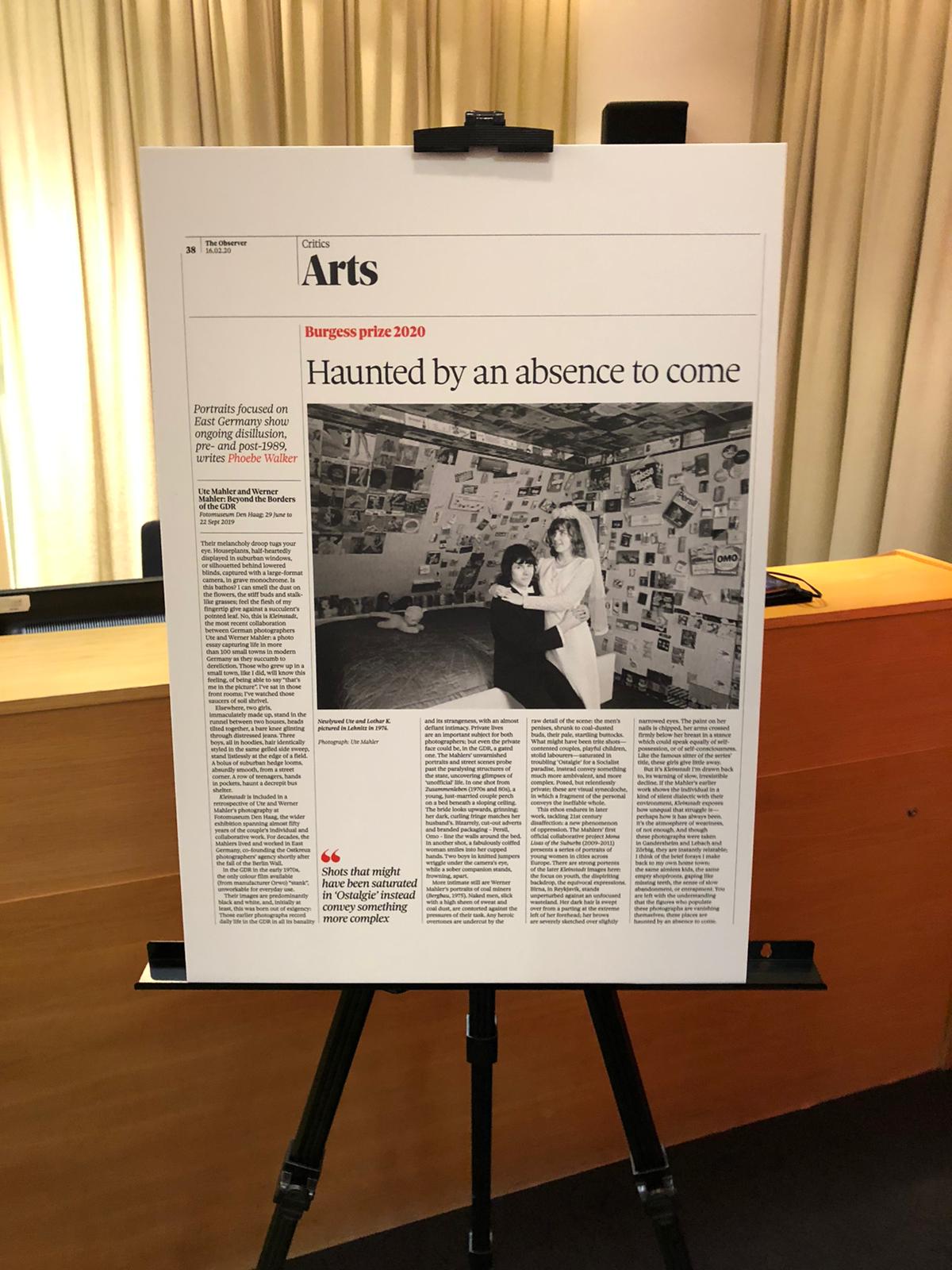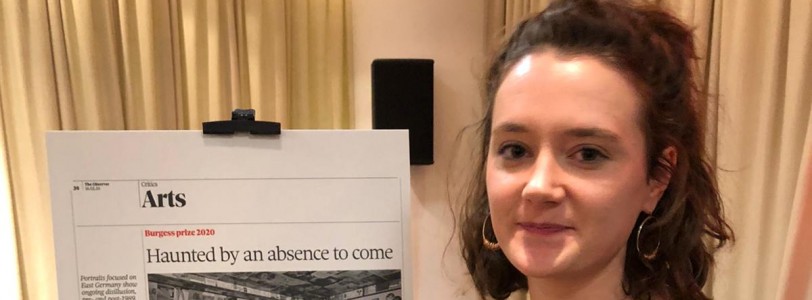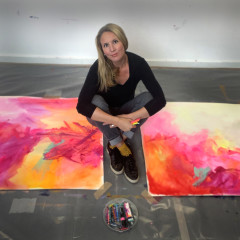Could you first introduce yourself to the reader?
I’m 27, currently living in the Netherlands (where my partner’s job is based), though expecting to move back to the UK later this year. I work on a freelance basis as a development consultant for not-for-profit organisations, largely in the arts sector. I also write as a poet and arts journalist.
Can you tell us more about your role as a development consultant? What does it consist of?
I work with a range of different organisations, from independent theatres to large organisations like the British Council, to grassroots arts and social justice groups. My role is to support these organisations to develop and grow their work, reach and impact, through fundraising, programme and business development.
You are also a poet, with a pamphlet coming out later this year. When did you first get interested in poetry?
I entered and won the Foyle Young Poets’ Award when I was a teenager, and that’s really what got me hooked – before that, I’d never thought that poetry could be something ‘for me’, but then I understood that poetry can be for everyone who wants to read it, and write it.
Who do you take inspiration from?
As a writer, I enjoy reading the work of poets such as Tara Bergin, Caroline Bird, and Stephen Sexton – creators of textual universes where things are always off-kilter and unsettled. In the rest of my working life, I have a strong group of friends, many of whom are also working in the arts, who I know I can always go to for advice, support, and just a good moan. I’m also very lucky to have family and friends who also work in the arts sector, or are artists themselves – my Mum is a published author, my sister-in-law is a theatre maker and actor with Imitating the Dog theatre company, and my partner’s Mum is an arts consultant. Their support, and their understanding of what it means to have a creative practice, is a regular source of support and inspiration. I know I’m very fortunate to have that.
What is the process for getting a pamphlet released?
There are so many fantastic small poetry presses working in the UK – often working incredibly hard without thought of profit – which means there are a lot of great outlets for new work in poetry. I don’t think there’s any set route to pamphlet publication, but in my case, I’d collated and edited a small collection of around 25 poems (written over the past three or so years), and sent this off to a number of small presses whose work and publications I admired. I had a track record of publication in poetry magazines and anthologies (I’d also won a Northern Writers’ Award) so I could show that I was serious about poetry, and that I’d been writing for a few years. I was fortunate enough for one press to say yes, and offer me publication. I’ll go through a process of editing that manuscript of poems with the press, and then it will be released as a pamphlet – with a launch event – later this year. It’s not been a quick process (I’m not a particularly quick writer!) but I’m thrilled that it’s happening.
You’re also an accomplished reviewer, getting shortlisted for The Observer/Anthony Burgess Prize for Arts Journalism this year. Tell us about the review?
I reviewed a retrospective exhibition of the work of two German photographers, Ute and Werner Mahler, which was shown at the Fotomuseum Den Haag. I’d never written about photography before (in the past I’ve reviewed poetry, fiction and theatre), but I found the exhibition so compelling and unusual, particularly in the way it connected with some of my own experiences and perspectives, that I knew I wanted to write about it. Initially I worried that I didn’t have the ‘authority’ or the insight to write about it, because I didn’t previously know very much about the artform, or the photographers – but the strength of my feeling and interest for the work helped me to get past that.
How did it feel when you were nominated?
It felt brilliant – a real validation of my ability as an arts critic. I was pleased that something I had thought and felt about so deeply struck a chord with the prize judges. The fact that the award was also supported by a national newspaper, and judged by one of its editors, was also exciting. I don’t do any (paid) journalistic work, and have no formal experience as a journalist, but the nomination made me feel like that didn’t matter as much as I’d thought; my writing, and the work I’d put into it, was what mattered.
 And what was the award ceremony like?
And what was the award ceremony like?
It was a great night. It was held at the Observer and Guardian Offices in central London, and hosted by the prize organisers, the Anthony Burgess Foundation and the Observer. All the shortlisted articles had been printed, as they would be in the print edition, blown up and set up on easels around the room, which looked fantastic, and also meant you could read everyone else’s (intimidatingly good) work. I got to meet other shortlistees, who included a playwright, journalism students, and published authors, had some great, supportive conversations and did some useful networking.
In your review, I particularly like how you marry powerful and evocative descriptions of the photographs with your own experiences. How much of the personal do you think belongs in a review, and what does that offer a reader?
I think if there’s a personal element in your understanding of a piece of work, and if you think acknowledging that will help to create an engaging, lucid review, then it’s fine to do so. You obviously don’t want the review to become more about yourself than the subject you’re reviewing, but art is subjective, and the human context into which art is being received is part of what gives it its value, I think. With my review of the Mahlers’ exhibition, their presentation of under-resourced, half-abandoned small towns struck a chord with what I’ve experienced, as have friends and peers. So I wanted to acknowledge that I recognised this phenomenon, and I also wanted to show that this work had a wider application, beyond the immediate context of suburban Germany.
How long did it take to write? Were there any areas that gave you difficulty?
It was probably a day’s work – although spread over a week or so. My main concern was making sure that I’d understood the context and background properly – there was a lot of information about the photographers to research, which wasn’t all available in the exhibition. Various interviews and articles were also written in German, so I had to rely on Google translate and my (very rusty) A-Level German to make sure I had the right information about different series of photographs, and the history and context behind them. I was also aware that this was a serious subject; the older photographs in the exhibition had been taken before the fall of the Berlin wall, and I wanted to give due respect to the weight of that complex social and political history (tricky in just 800 words) while also making sure the view was anchored from a contemporary perspective.
What is your process for writing a review? Do you start with a mess of notes, or are you able to stitch and structure things easily?
I tend to write a block of text that summarizes the work and my view on it, and then go back to the work itself and mine it for specific examples or themes to write about in more detail. I’ll also do some research on the artist and the work, and add any helpful or notable context, usually at the beginning of the review.
What advice would you give to would-be review writers?
Build up different platforms for your work, and don’t be shy of asking – there are a whole range of magazines, journals and news outlets, both on and offline, that will be interested in profiling arts criticism. The hard part is getting paid to do it! But a track record of published reviews, and experience as an arts writer, will help. Don’t shy away from things that you don’t immediately think are part of your ‘genre’ or subject area – engage with as much as you can, and write about what genuinely interests you.
Do you think there is a place for young reviewers and critics on the art and culture scene?
Absolutely. Everybody’s perspectives on arts and culture matters; especially those who don’t often get to make their voices heard, or who lack mainstream platforms. We’ve seen, particularly in the past couple of years, that young people are increasingly a force to be reckoned with in politics and society, and that presence and perspective needs to be felt in arts and culture as well.
Have you always worked in the creative sector? Could you give an outline of your career path?
Pretty much! After finishing university (I studied English Literature at Queens University Belfast, followed by a Masters in Literary Modernism at Edinburgh University), I was accepted onto a programme called the Arts Fundraising and Philanthropy Fellowship, based in London. That sounds quite grand, but really it meant I was learning the ropes in the arts sector, with a focus on how arts organisations can sustain and develop themselves. I did a year’s placement at the Bush Theatre in West London, and then went on to work at The Poetry Society, in their Education Team. After that, I worked at the social justice charity, Toynbee Hall, in the East End of London, before moving to the Netherlands in 2018 and launching myself as a full-time freelance development consultant.
If you could send a message back to 16-year-old you, what would you say?
Keep reading, keep writing, trust your instincts and worry less about what other people think.
And what advice would you give to a young person looking to follow your career path?
To any young person interested in making a career in the arts – be that performing, writing, producing, reviewing, administrating, event managing, or whatever else – remember that your desire to do this gives you a right to do it, regardless of what others might be telling you. Be active in pursuing your interests, and find people who share them. Be versatile, be open to different opportunities, to learning new skills, and to working in areas outside of your comfort zone.
Where can people find out more about your work and writing?
My Burgess Prize shortlisted review is online here, and you can also find some of my poetry reviews here.
My poetry pamphlet will be published later this year by Green Bottle Press.
My poems have been published in magazines such as The Tangerine, The Moth, Magma, Ambit, and one of my poems also forms part of the ‘Poem of the North’, created by the Northern Poetry Library.
And for more about my work and experience in arts development, you can find me on Linkedin here.









0 Comments